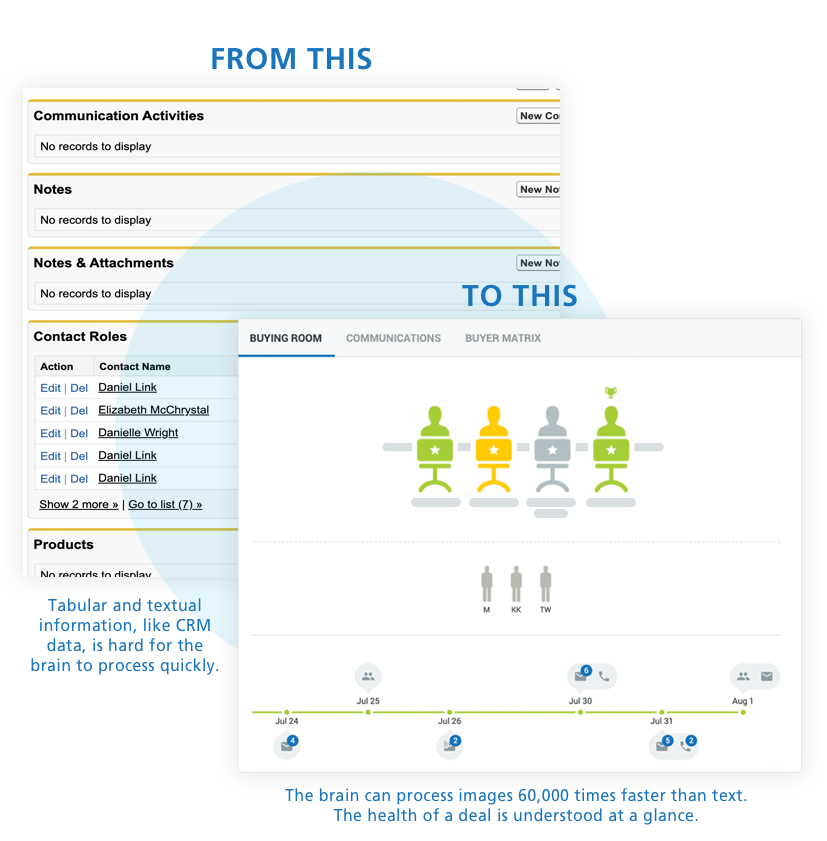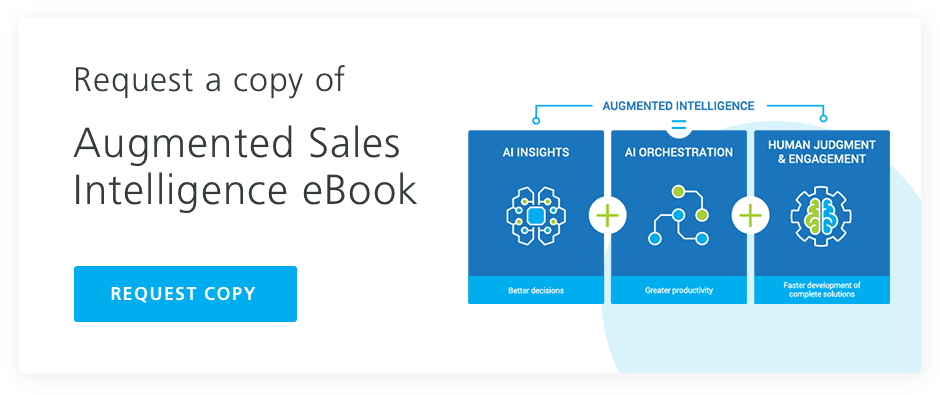sales
Use Cases for AI in Sales: And How to Prioritize Them
Artificial intelligence (AI) is the steam engine driving the “fourth industrial revolution” that is now upon us. And along with the rest of the world’s industries, AI is poised to disrupt and reshape the sales and marketing fields, as well.
But before you throw your hands in the air resign yourself to the machines, balance that figure against the following one. AI-driven tools may also lead to the creation of as many as 2 million new jobs in the next five years.
We can expect to see the sales field contracting, expanding, and reshuffling accordingly. AI will eliminate sales roles, of course. But it will also expand existing ones and create new ones.
This is the inevitable result of companies shifting their sales functions to the AI-powered digital realm.
The opportunities here for disruption and innovation are enormous. In fact, some researchers have dubbed this transition the “Sales Renaissance.”
Dependence upon AI will usher in a new era of potential invention and innovation. The sales world of Willy Loman will be all but extinct.
These claims seem rather sweeping if you don’t have a more granular picture of AI’s role in sales.
To that end, we’ve collected snapshots of some of the most fundamental, game-changing use cases for AI in sales.
After we run through those AI use cases, we’ll take a look at how you can prioritize and install them in your own sales operations.
Why is Using AI in Sales Important?
Massive machine brains are inserting themselves into all aspects of our lives. Without even necessarily being cognizant of it, we’re already interacting with them on a daily basis (watch Netflix lately?). Industries across the board must adopt the new AI paradigm or get left behind—and the same goes for sales.
If you want a robust sales pipeline and competitive performance metrics, you can’t rely on a basic CRM anymore. In 2021, you can’t be relevant in the business world without harnessing the all-important “big data.”
There’s a reason it’s so often referred to as the “oil” of the digital economy.
But humans can no longer cope with such voluminous amounts of new data. Nor can they interpret which data is important or unimportant, which data is credible and valuable and which is false or “garbage data.”
This is why AI tools are so important for sellers. Machines are so much faster and more efficient at taming these tsunami-like waves of information.
AI tools are able to process, analyze, and interpret massive sets of complex and unstructured data.
And we’re not talking about processing numbers in a spreadsheet. The machines are always learning. AI can process speech, image, and video data. All these are crucial inputs to the most vital sales functions.
Out of this mass of data, AI solutions:
- Reveal patterns and trends
- Generate accurate predictions
- And produce and visualize actionable insights
Most of which human beings wouldn’t have been able to see on their own.
Furthermore, AI can optimize every step of the sales process, particularly when it comes to sales conversion.
AI-driven solutions can:
- Keep tabs on potential leads
- Engage prospects at their precise moment of interest
- And keep that interest warm as the computer helps lead that prospect through the sales funnel
Then, at the right time, the AI system can submit to their human overlords. That is, they can deliver that prospect into the hands of an actual salesperson.
The difference is, this salesperson is pre-armed with all the info they need to close the deal.
So far, some sales environments have seen more of an impact from AI than others. AI has had a seismic impact on companies selling simple products or services with low margins.
In some cases, these types of businesses have moved completely online and automated all aspects of the sales cycle. Thus, AI has eliminated the need for human sales reps altogether.
AI in B2B sales is a different story. On the one hand, AI has so far had less of an extreme impact on the B2B sales workforce. This is likely because soft social skills (or, in other words, the “human touch”) are so crucial in this context. That’s one thing the machines can’t replicate (yet).
At the same time, complex sales environments often mean many buyers. Each of these buyers has different needs and information.
Sales reps need deep customer knowledge and the capacity to tailor materials to each buyer. AI can thus become a crucial component of sales enablement in this environment.
SEE ALSO: AI and Why the Approach You Take Matters

Types of AI Technologies
So how does AI work to fulfill the aforementioned sales functions? Let’s break AI down into its building blocks, so that we know exactly what we’re dealing with here.
At the heart of most AI tools are a set of deep learning-based technologies, including:
- Natural Language Understanding
- Automatic Speech Recognition
- Text-to-Speech Synthesis
- Voice-Operated Switch
- Media Resource Control Protocol
Those technologies inform the three most common AI methodologies in marketing and sales, which include:
The “neural network”
Traditional algorithms interpret data by following a logical set of step-by-step instructions. Neural networks don’t need that kind of programming. They don’t need to be given specific rules and an understanding of “the right answer.”
Instead, they solve problems by example (like humans). A neural network can turn reams of unstructured, messy data and produce insights a human would never be able to glean.
Here’s the craziest part: the more problems they solve and data they compute, the more they learn along the way (like humans).
The “support vector machine”
This powerful AI tool (also known as SVM) performs nonlinear classifications and makes time-based predictions. The SVM is thus a formidable tool for accurate sales forecasting (more on that soon.)
Natural language processing
Natural language processing (NLP) allows computers to generate organic, human-sounding language. This is the technology behind the ubiquitous chatbots on eCommerce sites, for instance. NLP is also used when an AI sales enablement tool suggests an auto-response email to a buyer.
How Can AI Support Sales?
So now we understand why AI is so important in sales for firms to stay competitive. And we’ve even learned a little bit about standard AI technologies. But let’s get even more granular. How can sales teams leverage these technologies to beef up their bottom line?
Let’s find out by running through some specific use cases for AI. We’ll use a hypothetical sales cycle as an example with the following stages:
- Pre-approach
- Engagement
- Presentation
- Post-sale assessment
AI can help build a pipeline
Sales teams can leverage AI before the selling even begins. It can help build a far healthier and more robust pipeline than sales teams can put together on their own.
In this use case, AI can help with:
- Segmenting markets in the pre-approach phase of the sale
- Estimating sales demand
- Scoring leads according to their potential to close
- Generating new leads

Let’s break it down a little further:
AI lets you find your total addressable market quickly
Most efforts to generate leads start by segmenting prospects into groups that share common characteristics. Marketing teams have been using customer segmentation for as long as time itself. Up until recently, though, they’ve been relying on traditional statistical algorithms.
AI tools like neural networks can segment personas even more efficiently. They can also upload the names, information, and contacts of all those potential leads into one database. Sales teams can thus access their target market segment and the contacts therein with negligible human effort.
AI helps you assess demand in your target market
Once sales teams have delineated their target market, the next step is usually assessing customer demand. AI has become the giant brain behind the curtain when it comes to the science of sales forecasting, which allows you to assess that customer demand.
Traditional sales forecasting uses statistics to discern future sales in a linear way from past sales data.
Combining the AI tools mentioned above (neural networks and SVM) is far more accurate than any single mathematical model. In fact, a recent 2020 study found that the AI neural network algorithm has a prediction error of less than 4%.
AI helps you find the leads most likely to close
Researchers have proven that AI-powered lead assessment tools are more effective than humans. In this case, businesses use SVMs and neural networks to perform predictive analytics that assess how likely a given prospect is to close.
NLP tools can also identify key words in prospect communications. Thus, predicting the probability that they’ll make the sale.
We’re concerned with getting high-value leads that are most likely to buy at this point in the sales cycle. But how do we know if those leads are going to stick with us? Technologies like neural networks and SVM can also predict customer churn.
AI can create lookalike sales opportunities
AI is so powerful when it comes to lead generation, in part because it’s so good at creating “lookalike” leads. Lookalike leads are potential future buyers who resemble past high-value customers. AI can parse out historical wins and then scan data to identify similar sales opportunities likely to follow the same pattern.
A Harley-Davidson dealership in New York used this same technique. They deployed AI algorithms to attract lookalike leads — and it worked. That dealership went from getting one qualified lead per day to 40.
And within three months of implementing AI in the lead generation process, the company’s number of qualified leads increased by 2930%. (Yes, that number is correct.)
AI can speed up sales cycles
Once you’ve established a robust pipeline of high-quality leads, AI can also keep them moving through the sales funnel.
AI applications can help sales teams engage their leads by tipping them off to the optimal time when those leads are most primed to buy. AI tools can do this in various ways, such as by gleaning information from a scan of internet searches and purchasing history.
Some organizations use AI to discern the best time in a “conversation” to engage leads. That software is what’s behind those increasingly lifelike chatbots that so often greet you when you open a new webpage.
Today’s natural language processing and text synthesis tech is astounding. Chatbots can strike up an eerily human-sounding dialog with a potential customer to uncover specific needs. Once the bot qualifies the lead, it will pass that potential buyer along to a human sales rep.
AI can also help optimize lead engagement by generating sales content. The technology is smart enough to build content like sales presentations and emails based on prospect pain points.
AI can also study the performance of past sales assets and make data-driven recommendations for future content.
Further, the tech can signal to sales reps when they should be engaging with a prospect, whether by replying to an email or reaching out over a chat.
AI can automate sales activities
Humans need to focus on human-centric things (that’s kind of an odd sentence, but here we are). That means outsourcing menial (but necessary) tasks to the robots. This helps reps get back to what they do best and reduces the risk of human error.
And these automation capabilities are more than rote data entry. AI-backed systems can even automate areas that usually need a human judgment call.
An example would be how to format and where to store a particular piece of data.
AI can also automate sophisticated inventory management and secure payment processing. And it doesn’t just accomplish those tasks. It carries out these activities intelligently, gathering data as it goes.
It never stops computing and analyzing this data, producing actionable insights for sales teams.
That’s the beauty of AI; it never sleeps.
SEE ALSO: The Cost of Manual CRM Data Entry and Five Best Activity Tracking Software Platforms
AI systematically prioritizes opportunities for maximum effectiveness
Where reps spend their time is one of the most critical factors in successful selling.
AI sales enablement tools will let the reps know when particular activities perform well and drive leads down the funnel. AI-powered sales enablement tools can also discern what content is most engaging and useful and what leads need the most attention.
Take Accent Technology’s Sales AI, for instance. The platform helps reps focus on prioritized lists of top opportunities. These clear snapshots visualize the health and risks of each account and opportunity.
It also notifies them when they need to respond to or follow-up with buyers. Sales reps are thus enabled to more precisely divide their time and resources.

Richer insights for Data-Driven Management and Strategy
As we discussed above, AI goes hand in hand with big data. One of the most valuable dimensions of an AI system is analyzing, interpreting, and visualizing buyer and seller information.
It can reveal behavioral trends and other key insights that sales teams can use to optimize their sales cycles going forward.
AI can help analyze seller performance.
Tools like our Sales Manager Dashboard offer sales leaders an instant glimpse into how their reps are performing. “Scorecards” visualize which reps are hitting their target engagement milestones.
The tool also offers snapshots of which accounts and opportunities your reps are engaging and how much effort they’re putting into each.
SEE ALSO: Sales Performance Management: Where Do I Start?
AI tracks content performance and customer behavior
Besides keeping tabs on your sales team, you can keep tabs on how your potential customers are engaging with your sales content.
Effective assets are the ones that are opened and shared at a high rate. AI can detect these engagement signals and report back to you. This lets you replicate that success in future content.
Of course, it also lets you know which assets are duds, so that you can cut them from your repository (or refresh them).
SEE ALSO: Sales Content Effectiveness and 5 Ways to Leverage AI in the Sales to Customer Hand-off
AI can identify success & failure trends with different industries or personas
The above two examples of how AI can generate insights from the data it collects are quite specific. But AI systems can also zoom out to reveal broader trends and patterns within your organization.
Are there certain business domains that your sales team never seems to gel with? Or are their certain types of buyers that seem like a guaranteed win every time?
AI can help refine your ideal customer profile
Over time, all these insights are going to give sales teams ever-deepening knowledge about their customers. As you learn more about proven purchasing signals, you’ll be able to create a more nuanced and flexible profile of your ideal buyer. And not only an ideal buyer, but a customer most likely to stay with your solution and provide a high lifetime value (LTV).
AI calculates ROI on various efforts and channels
AI can help you decide to invest more in a campaign or cut your losses and start over. Sometimes, what seems like a best practice is not actually generating that much real value for your team. AI-derived analytics will help you leverage your time and resources to where they’ll have the most impact.
AI generates sales coaching and continued learning
Where AI starts to get really futuristic is in its ability to detect human speech. If you’ve ever watched a video on YouTube and clicked the “auto-caption” button, you’ve seen this in action.
The AI is, in real-time, parsing out human language and putting the words onscreen. Sure, it may miss words here and there and not be the best at context clues, but the implications of this are staggering (especially for sales professionals).
AI can already detect speech. Once that technology is further refined, AI will be the standard means of seller coaching. AI tools will be able to analyze sales reps’ conversations and correspondence with buyers. It’ll then be able to generate feedback to improve future communication.
We’ve already seen the usage potential for this technology. It’s just a matter of time before it becomes the standard in sales.
Furthermore, researchers have studied this very topic. The data suggests that AI sales coaches are better able to produce data-driven feedback for sales reps than their human managers are. Humans can’t scale and compute data anywhere near the speed of today’s AI technology.
Several forward-thinking companies have begun taking advantage of AI coaches to offer on-the-job-training. From the insurance giant MetLife to the video conference king Zoom, these are real companies using this tech today.
Which AI Use Cases to Present to Leadership for Buy-In
We’ve spent the lion’s share of this post drilling down into the key use cases for AI in sales. We’ve talked through AI use cases through each phase of a typical sales cycle. The next step is to consider how to most efficiently and systematically inject them into your own organization.
Investing in AI-powered sales enablement requires full endorsement from your organization’s leadership.
This technology is a serious disruption of the status quo, and may ruffle some feathers.
You need both financial buy-in and a willingness to fully embrace the shifting sands of sales technology. This means a wholehearted endorsement of the necessary onboarding and adoption.
If your leadership or team has objections, it’s better to address them now. You don’t want those rumblings of dissent cropping up midway through AI tech adoption.
So which use cases should you present to your stakeholders if you want them to prioritize an AI investment?
It all depends on your organization’s mission, business philosophy, goals, and current strengths and pain points. Let’s take a look at some strategic steps you can take to help make your decision.
Start with the right questions
As you sit down to start examining how to leverage the power of AI for your sales team, start by framing your research with some key guiding questions:
- What AI use cases are my competitors already taking advantage of?
- How can I identify and rank the AI use cases that are right for my company?
- What will be the ROI from implementing those AI use cases that I select?
- What are the potential risks of implementing these AI use cases in my sales initiatives?
- What obstacles are potentially in the path of implementing these AI use cases?
Research, research, research
Compile a list of up to twelve AI use cases that are relevant to your particular sales environment, keeping the above questions in mind.
Circulate the list with key stakeholders in your organization and elicit their feedback. Eliminate the AI use cases that they pose objections to, as well as any use cases for which you’ve identified significant roadblocks to implementation.
Do a preliminary ranking
After discussing your AI use-case list with your stakeholders and refining it accordingly, start ranking them before you go to make your pitch to leadership.
Start by identifying one business value that implementing AI will hopefully impart to your organization, and then putting the AI use cases that are highest in that business value at the top of the list.
Refine your list one last time
After you’ve ranked your AI use cases according to their relative potential business value, then it’s time to refine your rankings one last time before you present it to leadership.
Among those high-value propositions, prioritize the AI use cases that are most cost-effective and that have the potential to expand and/or optimize something your company is already doing.
And then, among those prioritized AI use cases, identify the ones that have the most inter- and intra-organizational reach. For instance, prioritize an AI use case that not only enables salespeople, but enriches the marketing department and enhances customer experience.
Final Thoughts
Finally, when you present your use cases to your company’s decision-makers in your bid to get them to buy in to prioritizing an AI investment, make sure you also have clearly defined and consistent KPIs established.
This will help them to clearly visualize how they’ll be able to assess the ROI on that investment.
Accent Technologies is the first and only SaaS company to bring together Sales AI and Content Management in a true Revenue Enablement Platform. We provide both sales and marketing with better visibility into the performance of their teams. This drives revenue through intelligent recommendations for complex sales scenarios and provides the data for rich analytics that power better coaching, forecasting, and long-term customer support. Learn more about our solutions or request a live demo to see it in action.
By Accent Technologies
9th March 2021
AI in Sales the Accent Way
Accent is the first and only SaaS company to bring together Sales AI and Content Management in a true Revenue Enablement Platform.
We provide both sales and marketing with better visibility into the performance of their teams. This drives revenue through intelligent recommendations for complex sales scenarios and provides the data for rich analytics that power better coaching, forecasting, and long-term customer support.
Learn more about our solutions or request a live demo to see it in action.












